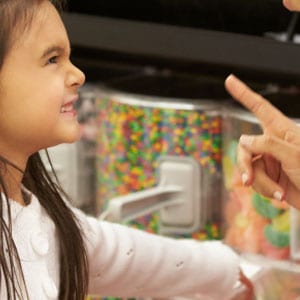
Becoming a Safe Parent
Do your kids feel safe telling you their innermost thoughts and feelings? On today's broadcast, Dennis Rainey talks with pastor and conference speaker Reb Bradley about building relationships of trust and respect with your children. Hear Reb tell about some parenting mistakes he made early in his parenting career, and what he did to change his parenting style. Today, Reb shares the delightful story of how he and his wife adopted their fourth child.
Show Notes
About the Host
About the Guest
-
Do your kids feel safe telling you their innermost thoughts and feelings? On today's broadcast, Dennis Rainey talks with pastor and conference speaker Reb Bradley about building relationships of trust and respect with your children. Hear Reb tell about some parenting mistakes he made early in his parenting career, and what he did to change his parenting style. Today, Reb shares the delightful story of how he and his wife adopted their fourth child.
-
Dave and Ann Wilson
Dave and Ann Wilson are hosts of FamilyLife Today®, FamilyLife’s nationally-syndicated radio program. Dave and Ann have been married for more than 38 years and have spent the last 33 teaching and mentoring couples and parents across the country. They have been featured speakers at FamilyLife’s Weekend to Remember® marriage getaway since 1993 and have also hosted their own marriage conferences across the country. Cofounders of Kensington Church—a national, multicampus church that hosts more than 14,000 visitors every weekend—the Wilsons are the creative force behind DVD teaching series Rock Your Marriage and The Survival Guide To Parenting, as well as authors of the recently released book Vertical Marriage (Zondervan, 2019). Dave is a graduate of the International School of Theology, where he received a Master of Divinity degree. A Ball State University Hall of Fame quarterback, Dave served the Detroit Lions as chaplain for 33 years. Ann attended the University of Kentucky. She has been active alongside Dave in ministry as a speaker, writer, small-group leader, and mentor to countless wives of professional athletes. The Wilsons live in the Detroit area. They have three grown sons, CJ, Austin, and Cody, three daughters-in-law, and a growing number of grandchildren.
-
Reb Bradley
Reb Bradley, father of 6, is a pastor who ministers to the Body of Christ at large. Reb has been a radio counselor and talkshow host, and as a writer and national conference speaker he draws from the Scriptures, as well as his mistakes and successes, to strengthen the modern Christian family. He conducts seminars internationally and teaches extensively on issues related to marriage, fatherhood, child training, and single Christian living. Reb is most noted for his bestselling book Child Training...more
Do your kids feel safe telling you their innermost thoughts and feelings?
Bob: … individuals, autonomous, and every person, as he grows to adulthood, has to establish his own identity, his own independence, his own sense of self, and you were telling your kids, "You won't have a sense of identity or self, you'll have the one we prescribe for you, and if you don't, you're in trouble."
Reb: You'll have it within our little circle of reference. In fact, there is more to the story. So here is my son, 20 years old now, we're talking about the tattoo; 20 years old, he was living in Lake Tahoe, he calls me says, "Dad, I can't make it up here. I really need to come home. I want to live with you guys. I know you're not in town anymore, you moved out to a farm," he says, "I want to come live with you and go to school."
I said, "That's no problem, son, but, look, you're going to be a pastor's son again at home. You've got to wear sleeves that cover your tattoos" – plural …
Dennis: So he's got more now.
Reb: You've got to yank the earrings, the things that he had cultivated while he was on his own. I said if you want to come home, I can't have people point at the pastor's son saying, "Don't be like him." He said to me over the phone, "Okay, never mind, then."
A few months later, he calls up again, six months later, he says, "Dad, I really need to come home." I said, "Well, you know the rule." He says, "That's no sweat. The Lord has already dealt with me about the earrings. They're gone, that's not a problem." I said, "Well, come on home." I regret that. Because ultimately I was saying, "I choose my church and what they think of me over my children."
Dennis: Yes.
Reb: I looked back for years, that's what was guiding me, is I was trying to please everyone else around me and sacrificing my children, ultimately, who they were. And so if that were to occur now, I would say, "Come on home, tattoos and all."
Dennis: I just want to say in response to that, reflecting back on my little encounter by the window with the multiple colors of hair – that occurred at the end of parenting six teenagers. Had that same incident occurred a decade earlier, I think I might have been – well, I'd done some of those things like you're talking about, and you can see the hurt in the child's eyes.
Now, one of the questions I wanted to ask you was about your church. Was your church that judgmental? I mean, what's going on there?
Bob: Well, you'd trained them to be that judgmental, didn't you?
Reb: Well, I didn't say anything about the church being judgmental, but I mean I don't want to speak against it. There were about 500 of us. We were there because of a common desire for wonderful children. Many of the people were there because of my seminars and my books, and so they would come for this Utopia place where we can have families strengthened and children with strong values and courtship is upheld.
So I felt a great – probably a lot more pressure than your average pastor because I had been the one who had been leading the charge saying, "You can have your children be perfect if you just keep doing it right," and so here I was, leading the charge, I'm having to look at my adult children not fulfilling the standard that we'd all held.
And that was part of my waking up was realizing that our adult children – some successfully shaping their children in their adult years, a minority. But, for the most part, children I watched – even in my own fellowship, grow up and make their own decisions and decide how they are going to respond.
A dog will salivate at a bell for the rest of its existence because it's not a human, you can train it. But a child, they grow up, and they ultimately decide, "What am I going to do with all this training I've received?"
Dennis: I have a friend who was sharing about his daughter coming to him and said, "Dad, I'm really doubting whether God exists." And this dad – I'm not made of this kind of stuff, because do you know what this dad said? He said, "Great, sweetie, you've got some doubts. You know what? That's a sign that you're coming to your own convictions and conclusions. Can we talk?"
What did he just do? He created safety for his daughter in the future at other points of doubt to come to him and be able to express those doubts without fear of being reprimanded or saying, "Oh, you shouldn't think that way. You were raised differently." But instead he affirmed her coming to him and expressing her doubts and then, secondly, he reached out to her in a relationship to go get a Coke and say, "Let's start the dialog. Let's interact with this."
Reb: That's fascinating.
Dennis: Isn't that cool?
Reb: You've said the key word, though, the word, the optimum word is "safe." And that's what I was not. My wife was not – for our children. We were not safe. They could not be real, they could not bear their hearts from the time they were young.
They could not say how they really felt because they'd only be corrected. "You can't feel that way, you can't think those thoughts, those are bad thoughts, those are spiritually immature thoughts," and so we would immediately begin admonishing them – actually, I did it more than my wife. She is more relational. She's a little more like Mary Poppins, but me? Oh, I was only corrective.
And now, with my children, they open their heart to me, and I listen. And here is what I do. If they have a value I don't like, the value will not change by me correcting the value. Instead, I now create a plan of relationship of time spent, whether ministry or counseling with them in the Word devotions where I try to seek to change their heart, where the value comes from. There's a big difference between, "You shouldn't like that, what do you mean, you like a girl? That's not safe. You're only 13." To, "Wow, I could see why you like her. She is a neat girl."
Bob: Yes, now, that's – and that's huge for a guy who wrote this book on courtship when a 13-year-old son comes up and goes, "Dad, I think I like this girl." You really have to train your impulses.
Dennis: You're going against gravity at points, aren't you?
Reb: Sure, but bottom line is, that's what he likes, or that's what my daughter will like, if she likes a boy. I have to be a safe person because that's where relationship comes from.
Dennis: We recently had a guest here on FamilyLife Today, Reb, and, unfortunately, we didn't get to mention this verse on the air, but I forget exactly, Bob, how did she quote Exodus 14:14 this is a great verse for parents. Exodus 14:14 – memorize this verse as a parent. It's not different, all right? I'm going to quote it, first of all, in the New American Standard, and then I'm going to tell you what Eugene Peterson's paraphrase in the message version of that verse is. Exodus 14:14 – "The Lord will fight for you while you keep silent." And her paraphrase was, "God will fight for you – shut up."
[Laughter]
And as a parent when your kid shocks you with the tattoo, the nose pierced, the ears and whatever else, you know, let the big deals be big deals and all the rest just keep your mouth shut.
Bob: Let me just ask you, because in your book, Parenting Today's Adolescent, you encourage parents to say what are our values, what are your values, and then point your kids in the direction of those values. Now you're saying that's still true, but don't necessarily die on every hill.
Dennis: Well, in that book, Bob, part of what we talked about is – the process of parenting is passing your convictions on to your children, but then, as they grow through the 13, 14, 15, on through adolescence, you have to watch them test those convictions of yours and let them fail and succeed and let those convictions become their convictions. That will mean, from time to time, that they are going to develop beliefs and values that will be different than yours.
But the goal of parenting, I think, is to ultimately step back, take your hands off, and watch your children begin to exercise their own faith, their own free will, and their own convictions about what they're going to base their lives on.
Bob: And your adult children have come to some conclusions different than your values, right?
Dennis: No doubt about it, and …
Bob: And how do you handle that, Dad?
Dennis: Well, Exodus 14:14.
Bob: Let the Lord fight the battle and shut up, right?
Dennis: Well, seriously, the parenting job is done. Barbara and I have had to take our hands off the parenting plow. We are no longer plowing in the human heart in the same way we were during the adolescent years. You know what? Sometimes our hands have to be pried off that plow, but it doesn't mean we still can't speak truth, it doesn't mean we still can't, on occasion, if they give us permission, correct.
Bob: Now, you haven't lost your influence completely, right?
Dennis: I don't think so. I hope it's growing. But that's really more up to our children than it is to us, I think. The bottom line is our children, I think, have to give you the power to speak truth in love. In fact, as our children have emerged into marriage, we've actually gone to them and said, "Let's just get this straight, I'm not going to offer advice unless you ask for it; unless you really want to know what the truth is." I want to tell you something – that is really, really hard.
Bob: I wonder how many of the folks who have listened to us today look back at their parenting and think, "We really have been focusing on the externals and have not been trying to get to the heart issues with our children."
I think of the book that our friend Tedd Tripp wrote a number of years ago called Shepherding a Child's Heart. It's really a classic book that provides a consistent philosophy of parenting that presses us in the direction of the heart and away from behavior modification, which, as you've said today, really, is what the Pharisees were all about, trying to get people to conform outwardly, and we ought to be concentrating not simply on modifying a child's behavior but on a child's heart attitude and helping shape that heart attitude.
We've got copies of Tedd's book in our FamilyLife Resource Center. Again, it's called Shepherding Your Child's Heart. There is also a companion workbook that goes along with it, and there is information about both of those resources on our website at FamilyLifeToday.com.
You can also call us toll free at 1-800-FLTODAY. That's 1-800-358-6329, 1-800 “F” as in family, “L” as in life, and then the word TODAY, and someone on our team will make arrangements to have the resources you need sent out to you.
In each of the cities where FamilyLife Today is heard there are a handful of families who in listening to the program through the years have looked at each other and said we believe enough in what God is doing through the ministry of FamilyLife that we want to support that ministry not with just a onetime donation but on an ongoing basis. We call these folks legacy partners and they make a monthly contribution to the ministry of FamilyLife Today.
Our legacy partners go a long way to help underwrite the production and syndication costs of our daily radio program but in the past year as you might imagine we’ve had a number of those families who have said we can’t keep doing that because of the current economy. They have had to step away from what they had hoped to be able to do.
So as we start 2010 we hope there might be some families who would step forward and become new legacy partners who would join us and agree to make a monthly contribution to support the ministry of FamilyLife Today.
If you do that the first thing we do is send you a thank you kit that includes resources designed to help strengthen your marriage and then each month as you fulfill your legacy partner commitment we make available to you additional resources designed to help you or to help you help others. In addition those of you who sign up as legacy partners and make arrangements to have your donation done by bank draft or credit card draft we send you a certificate so that you and your spouse or another couple you know can attend one of our Weekend to Remember® marriage conferences.
Your support is vital and I want to ask you whether you and your family could become one of those legacy partner families in your community. If you could go online at FamilyLifeToday.com and there is information there about how to become a legacy partner. Or call 1-800-FLTODAY, 1-800-358-6329. We do appreciate your support of FamilyLife Today.
Now, tomorrow, we are going to be back to talk about the importance of the priority of our relationship with our children as parents. Reb Bradley will be back with us as well. I hope you can join us.
I want to thank our engineer today, Keith Lynch, and our entire broadcast production team. On behalf of our host, Dennis Rainey, I'm Bob Lepine. We'll see you back next time for another edition of FamilyLife Today.
FamilyLife Today is a production of FamilyLife of Little Rock, Arkansas.
Help for today. Hope for tomorrow.
We are so happy to provide these transcripts for you. However, there is a cost to transcribe, create, and produce them for our website. If you've benefited from the broadcast transcripts, would you consider donating today to help defray the costs?
Copyright © FamilyLife. All rights reserved.
www.FamilyLife.com




